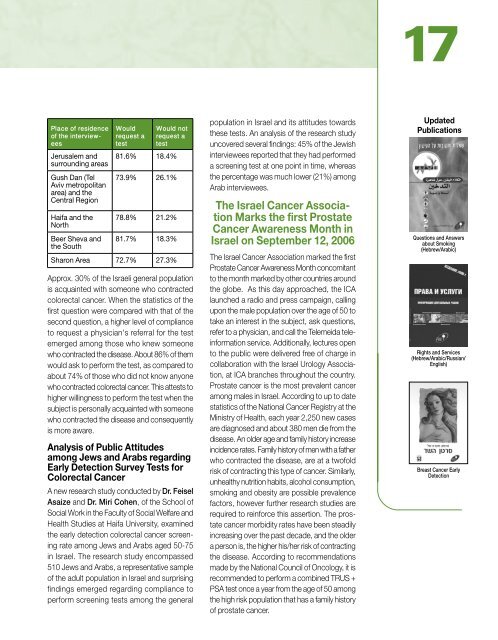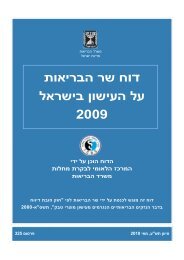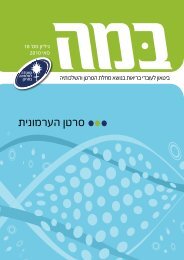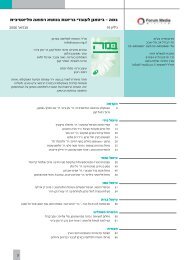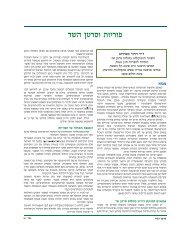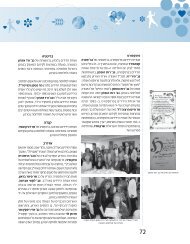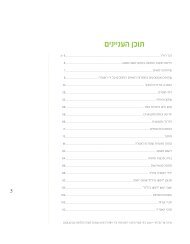Annual Report 2006
Annual Report 2006
Annual Report 2006
You also want an ePaper? Increase the reach of your titles
YUMPU automatically turns print PDFs into web optimized ePapers that Google loves.
17<br />
Place of residence<br />
of the interviewees<br />
Jerusalem and<br />
surrounding areas<br />
Gush Dan (Tel<br />
Aviv metropolitan<br />
area) and the<br />
Central Region<br />
Haifa and the<br />
North<br />
Beer Sheva and<br />
the South<br />
Would<br />
request a<br />
test<br />
Would not<br />
request a<br />
test<br />
81.6% 18.4%<br />
73.9% 26.1%<br />
78.8% 21.2%<br />
81.7% 18.3%<br />
Sharon Area 72.7% 27.3%<br />
Approx. 30% of the Israeli general population<br />
is acquainted with someone who contracted<br />
colorectal cancer. When the statistics of the<br />
first question were compared with that of the<br />
second question, a higher level of compliance<br />
to request a physician's referral for the test<br />
emerged among those who knew someone<br />
who contracted the disease. About 86% of them<br />
would ask to perform the test, as compared to<br />
about 74% of those who did not know anyone<br />
who contracted colorectal cancer. This attests to<br />
higher willingness to perform the test when the<br />
subject is personally acquainted with someone<br />
who contracted the disease and consequently<br />
is more aware.<br />
Analysis of Public Attitudes<br />
among Jews and Arabs regarding<br />
Early Detection Survey Tests for<br />
Colorectal Cancer<br />
A new research study conducted by Dr. Feisel<br />
Asaize and Dr. Miri Cohen, of the School of<br />
Social Work in the Faculty of Social Welfare and<br />
Health Studies at Haifa University, examined<br />
the early detection colorectal cancer screening<br />
rate among Jews and Arabs aged 50-75<br />
in Israel. The research study encompassed<br />
510 Jews and Arabs, a representative sample<br />
of the adult population in Israel and surprising<br />
findings emerged regarding compliance to<br />
perform screening tests among the general<br />
population in Israel and its attitudes towards<br />
these tests. An analysis of the research study<br />
uncovered several findings: 45% of the Jewish<br />
interviewees reported that they had performed<br />
a screening test at one point in time, whereas<br />
the percentage was much lower (21%) among<br />
Arab interviewees.<br />
The Israel Cancer Association<br />
Marks the first Prostate<br />
Cancer Awareness Month in<br />
Israel on September 12, <strong>2006</strong><br />
The Israel Cancer Association marked the first<br />
Prostate Cancer Awareness Month concomitant<br />
to the month marked by other countries around<br />
the globe. As this day approached, the ICA<br />
launched a radio and press campaign, calling<br />
upon the male population over the age of 50 to<br />
take an interest in the subject, ask questions,<br />
refer to a physician, and call the Telemeida teleinformation<br />
service. Additionally, lectures open<br />
to the public were delivered free of charge in<br />
collaboration with the Israel Urology Association,<br />
at ICA branches throughout the country.<br />
Prostate cancer is the most prevalent cancer<br />
among males in Israel. According to up to date<br />
statistics of the National Cancer Registry at the<br />
Ministry of Health, each year 2,250 new cases<br />
are diagnosed and about 380 men die from the<br />
disease. An older age and family history increase<br />
incidence rates. Family history of men with a father<br />
who contracted the disease, are at a twofold<br />
risk of contracting this type of cancer. Similarly,<br />
unhealthy nutrition habits, alcohol consumption,<br />
smoking and obesity are possible prevalence<br />
factors, however further research studies are<br />
required to reinforce this assertion. The prostate<br />
cancer morbidity rates have been steadily<br />
increasing over the past decade, and the older<br />
a person is, the higher his/her risk of contracting<br />
the disease. According to recommendations<br />
made by the National Council of Oncology, it is<br />
recommended to perform a combined TRUS +<br />
PSA test once a year from the age of 50 among<br />
the high risk population that has a family history<br />
of prostate cancer.<br />
Updated<br />
Publications<br />
Questions and Answers<br />
about Smoking<br />
(Hebrew/Arabic)<br />
Rights and Services<br />
(Hebrew/Arabic/Russian/<br />
English)<br />
Breast Cancer Early<br />
Detection


